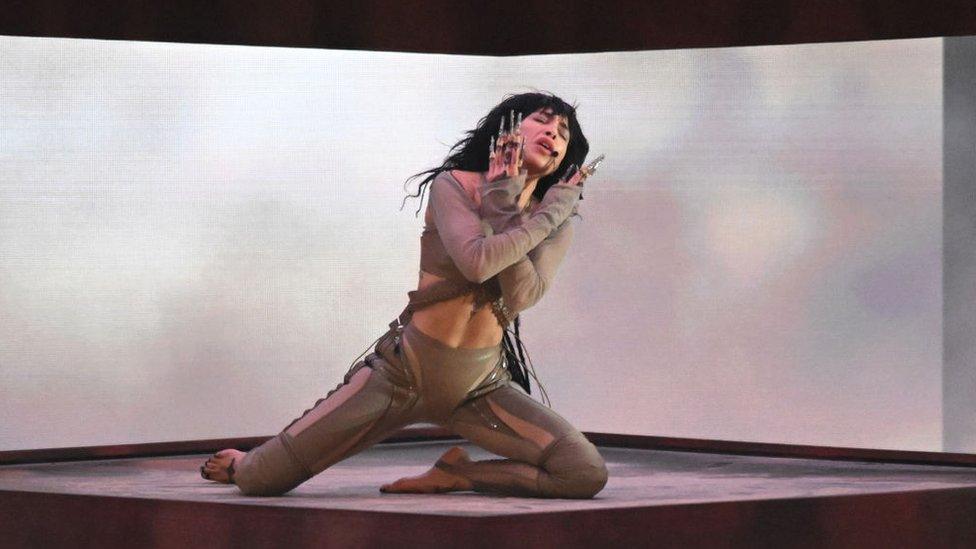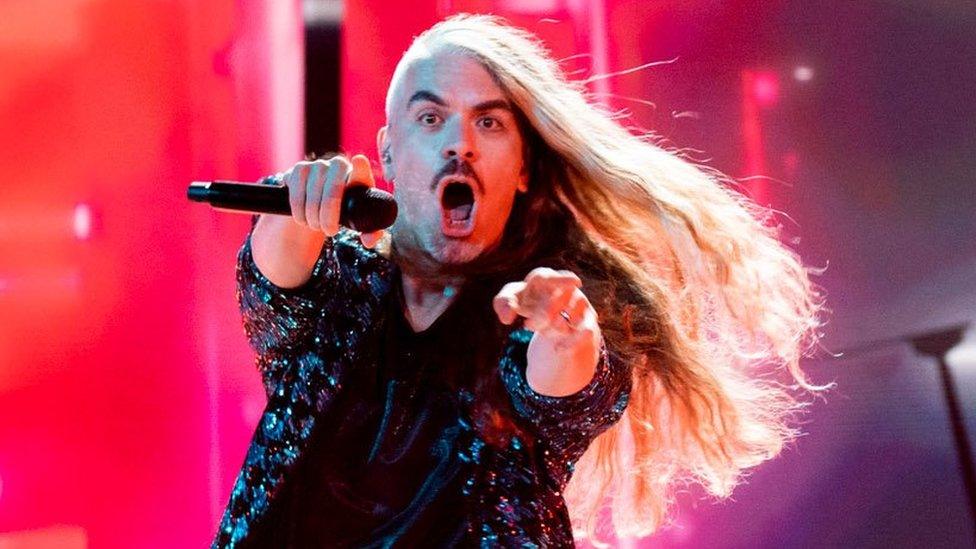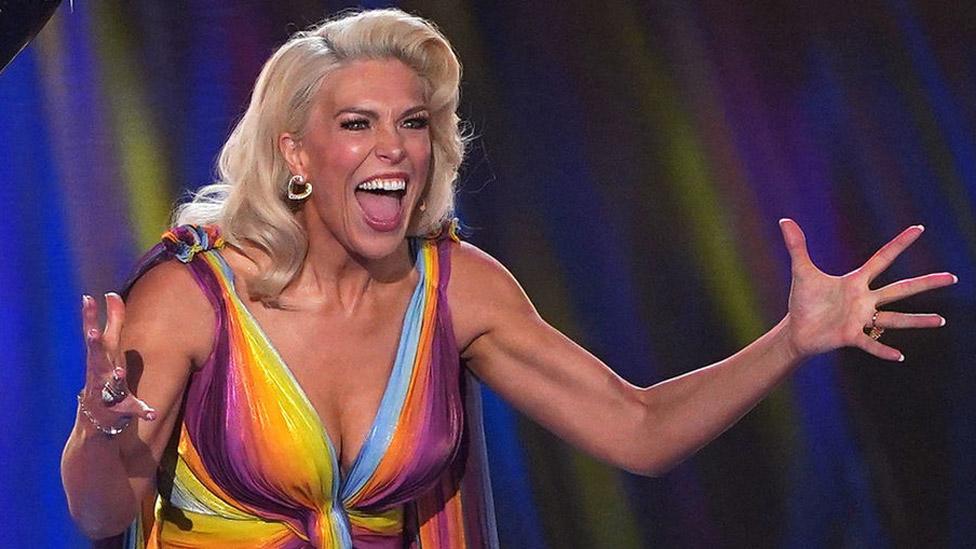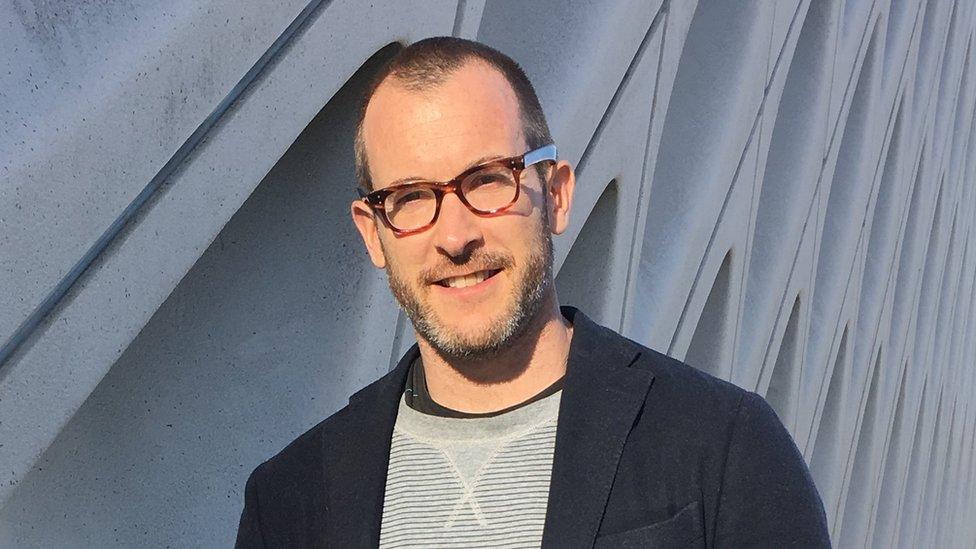Eurovision 2023: Austria to open Liverpool's song final with UK closing
- Published
During an interview with the BBC, a choir burst into song with her Eurovision entry, I Wrote A Song
The running order for Saturday's Eurovision Song Contest final has been revealed, after Thursday's knock-out semi-final completed the line-up.
Twenty six acts will perform in Liverpool to an expected global audience of 160 million viewers.
Austria will open the show with Teya & Salena's up-tempo Who The Hell is Edgar? - a song inspired by 19th Century poet Edgar Allan Poe.
The UK's Mae Muller will close the show with I Wrote A Song.
On Thursday night, Australian rockers Voyager and Slovenian band Joker Out progressed to the final alongside eight other acts.
Their success came after Tuesday's first semi, where every guitar group was eliminated.
Despite his 10.8m TikTok followers, Denmark's Reiley went out after the semi-final, as did five other countries.
The grand final takes place at 20:00 BST on Saturday, broadcast live from Liverpool Arena on BBC One.
The UK has taken on Eurovision hosting rights on behalf of Ukraine, after the invasion by Russia and Kalush Orchestra's win in Turin in 2022.
Ukraine's President Volodymyr Zelensky will not address the multi-millions of international viewers on Saturday night during the performance.
The EBU, which organises Eurovision, has long taken the position that the contest should be free of politics. Although this year's event has been reflecting Ukrainian culture, it was felt that an address from President Zelensky would contravene the spirit of the event.

Sweden's Loreen is the favourite among bookies and music streams
Downing Street has said it is "disappointed" by the decision not to allow President Zelensky to make an address. The prime minister's spokesman said he "believes it would be fitting" for the Ukraine leader to appear.
"The values and freedoms that President Zelensky and the people of Ukraine are fighting for are not political, they're fundamental, and Eurovision themselves recognised that last year when they rightly suspended Russia's participation from the competition, Downing Street said.
However, the spokesman added there are no plans to intervene and ask the EBU to change their mind.
Eurovision co-host Graham Norton told reporters it was the EBU's decision. "So we haven't been involved in that at all, and as you know the EBU rule with an iron fist so what they say goes."
Fans making their way to Liverpool for Saturday's final have been warned of train strike disruption.
Meanwhile, Luxembourg have announced, external they will rejoin the Eurovision Song Contest in 2024, three decades after they last participated and 40 years since the country's last win.
How was Saturday's running order decided?
Watch: Most notable moments from Eurovision semi-final two (UK only)
After each semi-final, the acts who qualified go into either the first or second half of the final - their selection is picked out of a bowl.
The big five - France, Spain, UK, Italy and Germany - automatically get through to the final because they pay more to the host broadcaster.
Last year's winner qualifies automatically too - and this time that's Ukraine's TVORCHI.
Once all 26 countries are confirmed, producers and Eurovision organisers work through each half to shape the show.
Organisers also need to ensure stage technicians can change the stage setup in less than 60 seconds between songs.

Does it ever have an impact on the results?
The vast majority of previous Eurovision winners - 43 out of 67 - all performed in the second half of the show.
The teams involved, known as delegations, always want their countries as close to the end of the running order as possible.
Viewers are perhaps more likely to remember a song closer to the voting lines opening rather than one at the beginning of the show - even if they are at a Eurovision party.
The second placing slot is legendary in Eurovision world - because no act which has been song number two has ever won.
Could Portugal's Mimicat change that? Probably not.
Do the favourites have a good placing?
The two big favourites - Sweden and Finland - drew a place in first half when they qualified for Saturday's final.
Finnish rap artist Käärijä's Cha Cha Cha is song number 13, that may sound unlucky but he is essentially closing the first half.
Loreen is song number nine for Sweden - that's the spot associated with previous BBC commentator Sir Terry Wogan who said he would always begin drinking at that point in the show.


Why is the UK closing the show?
The host country (normally last year's winner) always automatically qualifies for the final, so ahead of the semi-finals both Ukraine and the UK's position was randomly selected.
Ukraine drew song number 19, with the UK's Mae Muller getting the rare spot of closing a show on home turf.
Croatia's Let 3 will perform as the penultimate act and end their performance in y-fronts.

All the build-up, insights and analysis is explored on the BBC's Eurovisioncast.
Eurovisioncast is available on BBC Sounds, or search wherever you get your podcasts from.

Related topics
- Published12 May 2023

- Published13 May 2023

- Published12 May 2023
